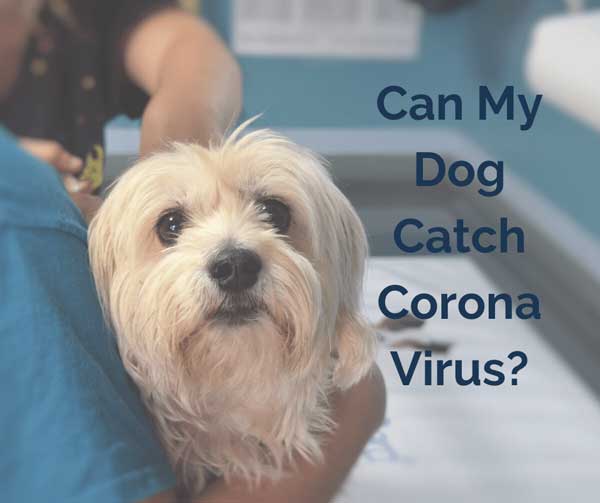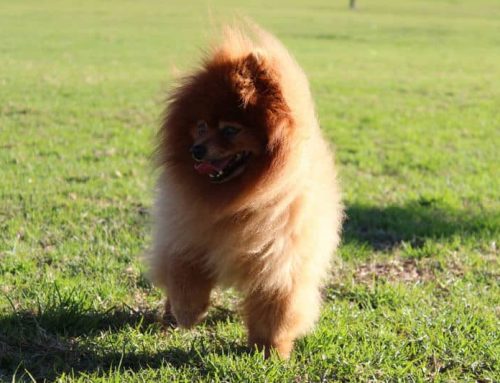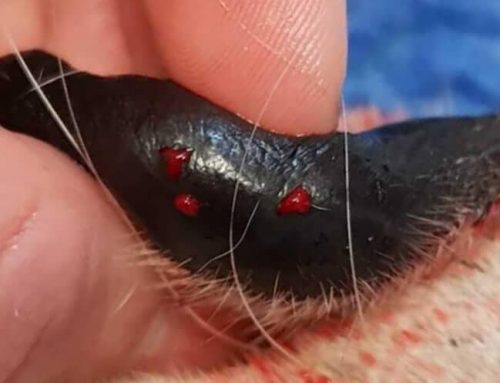Can My Dog Catch Coronavirus Covid-19?
Whether dogs can catch the coronavirus Covid-19 is an important question.
In this article, we will give an overview of what the COVID-19 virus is, the danger to dogs and what precautions you can take. Updated 6 April 2020

With the recent announcement that COVID-19 is a human pandemic, should dog owners be worried that their furry friend or any other animal can catch Coronavirus COVID-19?
Well, the answer isn’t quite as simple as a Yes Or No.
At this point in time, there is minimal evidence to suggest that your dog can contract COVID-19. However, your pet may well become contaminated with the virus – from humans with the disease.
Fortunately, there is no current evidence to suggest that your pet can contaminate you with COVID-19.
So why are people in a panic about the health of their pets? Read on to learn a little more about coronaviruses and how they occur in our environment.
If you prefer to watch a video, Dr. Leigh discusses how to protect your pets in this 10-minute video:
UPDATE 6.3.2020: Repeated PCR tests have shown that the Hong Kong dog is infected with COVID-19, however, it is not showing any clinical signs of infection or ill-health. Current recommendations remain.
UPDATE 12.3.2020:
A spokesman for the Agriculture, Fisheries and Conservation Department (AFCD) in Hong Kong said that:
“the blood test result of the dog which had repeatedly tested weakly positive for COVID-19 virus is negative.
The AFCD collected samples from the dog 5 times for tests since late February [2020] and detected low levels of the COVID-19 virus from its nasal and oral cavity samples. A blood sample was also taken from the dog on 3 March 2020 for serological testing and the result is negative. The negative result indicates that there is not a strong immune response and that there are not measurable amounts of antibodies in the blood at this stage.
The negative serological test result does not suggest that the dog has not been infected with the virus. It is known in some asymptomatic or mild cases of human infections with other types of coronavirus that antibodies may not always develop. It is also not uncommon in the earlier stages of infections to have a negative result as it often takes 14 days or more for measurable levels of antibodies to be detected. Another blood sample will be taken later for further testing”.
UPDATE 20/03/2020
Hong Kong’s animal welfare authority confirmed on Thursday that a second dog with an infected owner has caught the coronavirus COVID-19.
The two-year-old German shepherd lived with a person diagnosed with Covid-19. The dog arrived in quarantine on Wednesday, along with a four-year-old mixed-breed dog from the same home. The dogs were kept in separate kennels at the government facility.
Oral and nasal swabs taken on Wednesday and Thursday returned positive PCR readings for the German Shepherd but were negative for the other dog.
Neither animal had shown any signs of the Covid-19 disease, according to an Agriculture, Fisheries and Conservation Department (AFCD) spokesman, who added that it would “closely monitor both dogs and conduct repeated tests on the animals”.
UPDATE: 31/03/2020
Hong Kong Special Administrative Region (HKSAR) government informs us that a cat has tested positive to Covid 19. The cat has not shown any signs of disease
UPDATE: 05/04/2020
The United States Department of Agriculture’s (USDA) National Veterinary Services Laboratories has confirmed SARS-CoV-2 (the virus that causes COVID-19 in humans) in one tiger at a zoo in New York. Multiple tigers and lions at the zoo were showing symptoms of illness. It is believed that these large cats became sick after being exposed to a zoo employee who was actively shedding virus. The zoo has been closed to the public since mid-March, and the first tiger began showing signs of sickness on March 27.
What Is Coronavirus and COVID-19?
Coronavirus is the name given to a large number of viruses that may cause illness in humans and animals including dogs.
It’s important to differentiate what coronavirus we are talking about as not all of them are infectious to humans and most are specific to the host species.
COVID-19 is a type of coronavirus that has the formal name SARS-CoV-2.
The coronaviruses that can affect dogs and cats thankfully are unrelated to COVID-19.
When you hear people or the media discuss coronavirus in dogs, they will more than likely be talking about Canine Viral Diarrhoea. This is a virus caused by canine coronavirus (CCoV).
The situation of coronavirus in greyhounds in QLD and NSW is caused by Canine Coronavirus NOT COVID-19.
Canine Coronavirus only affects dogs and is not transmittable to other pets or to humans.
Coronavirus in cats is known as Feline Coronavirus (FCoV), this can cause mild gastrointestinal symptoms, however, mutations lead to the development of Feline Infectious Peritonitis (FIP), a disease that often kills.
We need to remember that the FIP form of FCoV is distinct from the enteric form (gastrointestinal form) of FCoV that occurs in most cats.
How Is COVID-19 Spread?
COVID-19 is a respiratory disease that is spread from person to person.
Coronavirus transmission between people occurs via respiratory droplets that carry the virus in the air when a person coughs or sneezes.
When these droplets land or come into contact with another person’s mouth or nose the virus can then enter the bloodstream of that person.
People can become infected by fomite transmission. This occurs when someone touches an object that a contaminated person has sneezed or coughed on, such as door handles, bathroom taps, public transport handles.
You could also pick up the disease by giving an infected person a handshake or kiss.

Is There A COVID-19 Vaccine For Dogs Or Other Animals?
Currently, there is no vaccine available for humans or animals that is protective against COVID-19.
However, there is a worldwide collaboration with scientists to develop a vaccine for humans.
A coronavirus vaccine for dogs is available, however, this is NOT PROTECTIVE AGAINST COVID-19.
Please remember that the COVID-19 is another form of coronavirus, unrelated to the specific animal viruses.
The dog coronavirus vaccine is not frequently given as dogs generally do not get this disease and if they do, it is often not severe.
Likewise, there is a vaccine for feline coronavirus, however, given that natural infection doesn’t convey lasting immunity it is rarely used in practice due to lack of lasting efficacy.
But The Dog In Hong Kong Tested Positive To Coronavirus?!
Recent media reports tell us that a dog in Hong Kong tested positive to COVID-19.
This is an interesting situation where the dog tested positive to COVID-19 after being in very close contact with its owners who were infected with COVID-19.
The test that was performed is called a PCR test and this isolates the presence of genetic material from COVID-19.

Initially, scientists thought that the dog had merely been covered by virus particles just as a door handle would be covered if an infected person sneezed.
The test told us that the dog had evidence of virus particles on the surface of its tonsils.
It was thought that the dog was acting as a fomite ie. similar to the scenario of an infected person coughing on a door handle that then gets touched by another person who then subsequently becomes infected.
To ensure that we know more about the transmission of this virus, further testing of the dog is being undertaken.
The dog is being tested for antibodies as this would show that the dog has formed an immune response to the infection.
To ensure the safety of people and other animals the dog is being cared for in quarantine.
As more testing was performed over the following days, it became obvious that the virus remained and was replicated in the tonsils.
This indicates that the dog is officially infected, but there is no evidence to suggest that it is capable of transmitting COVID-19 to humans i.e. infectious.
It should be remembered that this is the only dog case discovered and it was human to dog transmission.
It is highly unlikely that dogs are part of the lifecycle of this disease. If anything, they are what we term a dead-end host.
What Precautions Do I Need To Take?
Like any viral respiratory disease, the best precautions you can take to prevent illness is to avoid being exposed to people with this virus.
- Avoid close contact with people who are sick and coughing, sneezing
- Avoid touching your eyes, nose, and mouth
- Stay home when you are sick
- Cover your cough or sneeze with a tissue, then throw the tissue in the trash
- Clean and disinfect frequently touched objects and surfaces using a regular household cleaning spray or wipe
- Use a hand sanitizer when out and about in public, especially after using public transport, toilets and before handling food.
People who have a respiratory infection are advised to wear a facemask in order to limit the spread of the virus.
Wearing a mask to prevent yourself from catching the virus is ineffective.
Remember: There is no need for pets to wear masks.
If you are healthy, then you don’t need to do anything other than follow basic hygienic precautions such as washing your hands with soap and water before and after contact with any animal, including dogs and cats and ferrets.
At this point in time, the World Vet Association recommends that if YOU are infected with Covid-19 then you do need to avoid close physical contact with pets, just like you would avoid close contact with other people.
If you cannot have other people care for your pets, then it’s wise to avoid cuddling your pet, wear a facemask and ensure proper hygiene is followed such as washing your hands and not sharing utensils and plates.
There is no need to be fearful of your pet catching COVID-19 and transmitting the disease to you.





Leave A Comment